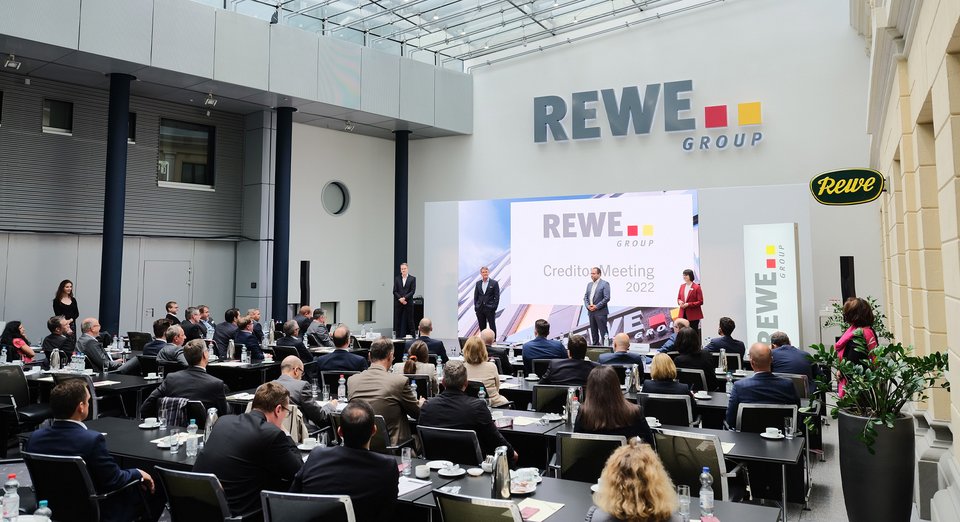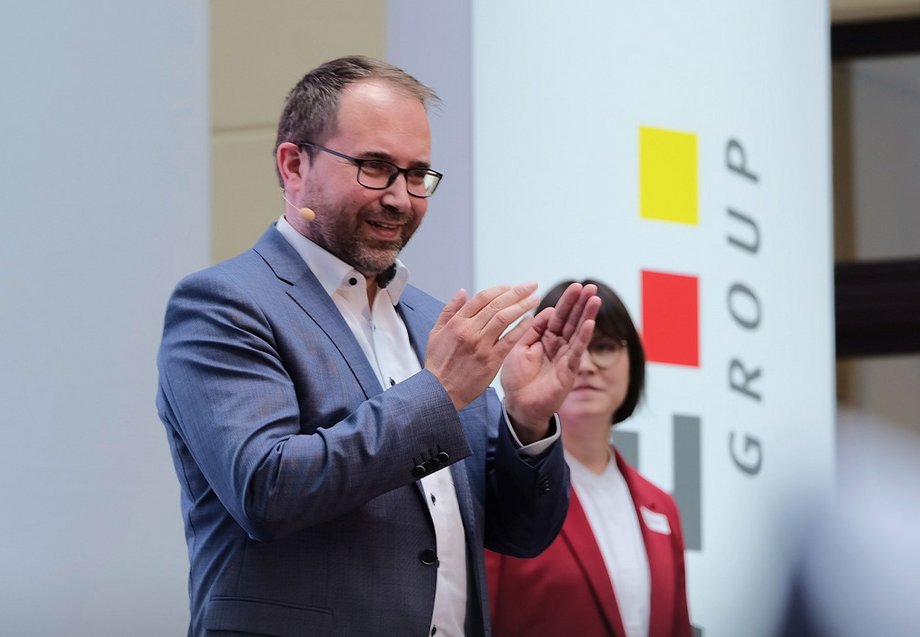
REWE Group has received an upgrade of its rating from BBB- to BBB (outlook: stable) from Standard & Poor's (S&P). As part of its analysis, S&P particularly recognises REWE Group's stable business profile with excellent market positions in Germany, Austria and the Czech Republic.
REWE Group is also a convincing driver of innovation, for example being one of the first retail companies to introduce convenience formats, focus on regional and organic products and introduce nationwide online grocery retailing in Germany.
"We are very proud of the upgrade of our rating. We feel confirmed in our strategy of sustainable, long-term growth and are pleased that S&P recognises the continuously positive development of REWE Group in recent years and has confidence in our financial strength and strategy. This is a strong signal of security and stability, especially in the current times," says Telerik Shishmanov, CFO of REWE Group.
 Telerik Shishmanov at the Creditor Meeting
In February 2010, the renowned rating agency gave REWE Group a rating of BBB- (outlook: stable) for the first time, which was maintained until the recent upgrade. This made REWE Group the first cooperative company in Germany to receive an internationally recognised rating. The rating has been investment grade since the initial rating process and is constantly monitored and updated in annual management meetings and through continuous communication between REWE Group and the rating agency. It certifies security and stability to third parties. It thus forms the basis for raising funds on the capital market and supports the diversification of financing sources.
Telerik Shishmanov at the Creditor Meeting
In February 2010, the renowned rating agency gave REWE Group a rating of BBB- (outlook: stable) for the first time, which was maintained until the recent upgrade. This made REWE Group the first cooperative company in Germany to receive an internationally recognised rating. The rating has been investment grade since the initial rating process and is constantly monitored and updated in annual management meetings and through continuous communication between REWE Group and the rating agency. It certifies security and stability to third parties. It thus forms the basis for raising funds on the capital market and supports the diversification of financing sources.
 Melanie Asghar
REWE Group has a stable business profile with excellent market positions in Germany, Austria and the Czech Republic. The company has now had its rating upgraded by the renowned rating agency Standard & Poor's (S&P). What this means, what advantages it brings and why trusting relationships with financial partners are particularly important in current times: We spoke to Melanie Asghar, Lead Creditor Relations.
Melanie Asghar
REWE Group has a stable business profile with excellent market positions in Germany, Austria and the Czech Republic. The company has now had its rating upgraded by the renowned rating agency Standard & Poor's (S&P). What this means, what advantages it brings and why trusting relationships with financial partners are particularly important in current times: We spoke to Melanie Asghar, Lead Creditor Relations.
one: Mrs Asghar, the renowned rating agency Standard & Poor's (S&P) gave REWE Group a rating for the first time in 2010. We have now recently had our rating upgraded from BBB- to BBB (outlook: stable). A naïve question: What does a rating mean and why is it important for REWE Group?
Melanie Asghar: There are various rating agencies - the three largest worldwide are Standard & Poor's, Fitch and Moody's. Since the first rating process in 2010, the rating has been renewed every year. Ratings are basically a certification to external third parties, especially financial partners, of a company's creditworthiness - in other words, how stable, secure and, above all, creditworthy a company is. It makes it easier for investors to answer the question of whether or not they want to invest in a company.
The better the rating, the better it is for investors, of course, because the probability of a company defaulting decreases with a good rating. In this case, the default of a company means that it can no longer repay its loan liabilities and, in the worst case, becomes insolvent. Investors naturally want to avoid this.
We are very pleased that we have now achieved the rating upgrade and are therefore even more attractive for banks and investors, which is ultimately also reflected in favourable conditions.
one: What has improved REWE Group's rating?
Melanie Asghar: As part of the analysis, S&P particularly recognises REWE Group's stable business profile with excellent market positions in Germany, Austria and the Czech Republic. REWE Group also stands out as a driver of innovation, for example as one of the first retail companies to introduce convenience formats, focus on regional and organic products and introduce nationwide online grocery retailing in Germany.
one: As a cooperative, REWE Group is not listed on the stock exchange. Who are our investors?
Melanie Asghar: Strictly speaking, as a non-listed company, we don't have any equity investors. Instead, our investors are primarily our lenders, i.e. the banks that provide us with our credit lines. There are also institutional investors such as smaller savings banks, cooperative banks or insurance companies that invest in our promissory notes.
one: In the Creditor Relations department, you manage the relationships with REWE Group's financial partners. How can I imagine this in concrete terms?
Melanie Asghar: We basically have three target groups: the banks, the credit insurers and the rating agencies. Our 18 house banks are defined by the share of our largest credit line that they provide. The banks have many information requirements, as they need to evaluate our company from a credit perspective, among other things, and need to know exactly how we are positioned financially and what our business model looks like. As the topics naturally evolve, new questions from the banks regularly arise, for which we are the first point of contact within the REWE Group.
We have contractual relationships with all of these partners, which means we have to provide regular reports such as annual financial statements or financial data planning. There is often a need for discussion and queries. We also have various business relationships with the banks - not just accounts, but also guarantees, financing and many other products and services. These are awarded through us as part of regular tenders.
one: That sounds like a lot of facts and figures. What role does personal dialogue play in this?
Melanie Asghar: It's very important because we want to build a relationship of trust with our contacts. It's sometimes difficult to assess strategic or future issues from the outside. We are translators for our topics and can categorise them accordingly. Our partners on the other side must be able to rely on our word. And when it comes to awarding business: we have made it our mission to be fair and give everyone a chance. If this is not credible, it can quickly lead to a lack of goodwill among the banking community.
In addition to individual meetings, we also invite our banks and credit insurers to an annual creditor meeting. After all, insurers would also like to know how REWE is developing and how it will develop in the future. This select group not only has the opportunity to obtain exclusive background information, but also to speak with the Management Board and receive insider information directly from the management. This year, Mr Shishmanov introduced himself as the new CFO for the first time at the Creditor Meeting and we bid farewell to Dr Mielsch among the creditors.
one: A decade ago, printed annual reports were still sent by post. Today, all it takes is a click to share the latest figures. How has financial communication changed from your perspective?
Melanie Asghar: Correct, the processes have become more digital, starting with the digital annual report. This makes analysing our figures a little easier. This is because the banks also rate us and have internal scorings, for which they can now simply import the figures into a system that takes over the evaluation. At the same time, this increases the importance of creditor relations and direct dialogue, because the qualitative aspect only comes into play when you talk to each other and we have the opportunity to classify key figures accordingly and explain the background and objectives.
one: And in terms of content? The industry is also constantly changing..
Melanie Asghar: One topic that has become increasingly important in recent years is sustainable finance. How does REWE Group shape its impact on the environment? How important is Sustainability for the company? A few years ago, hardly anyone would have asked that question, but it's different today. And of course the topic of digitalisation: we are developing very quickly in a very dynamic environment. There are many questions about this, such as how we are positioning ourselves for the future and reacting to the competition. Fortunately, we believe that REWE Group is well prepared for the challenges ahead, so our banks and investors are also favourably disposed towards our development.
